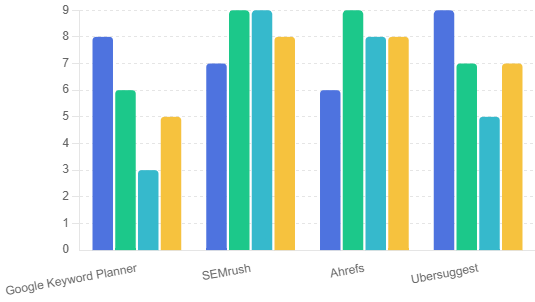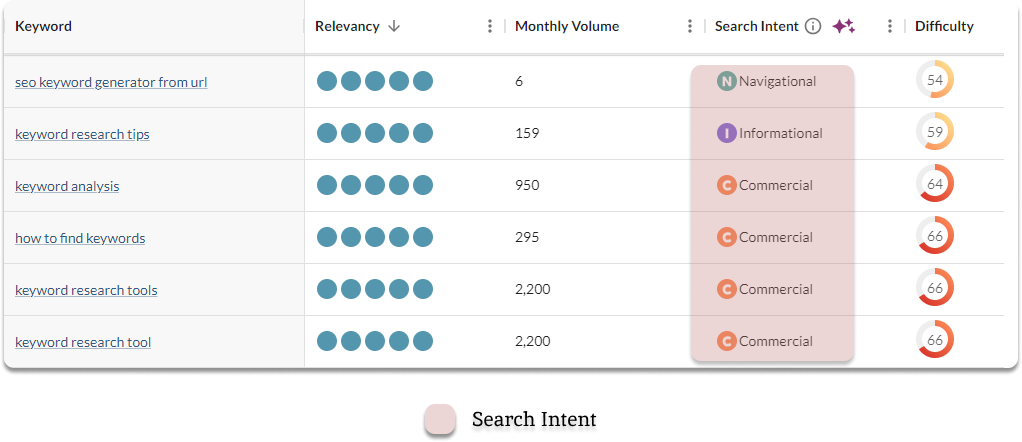Mastering keyword research is essential for a SEO plan. Knowing how to discover and utilize the keywords can greatly enhance your website’s visibility on search engines. This, in depth manual delves into seven tactics for excelling in keyword research in SEO enabling your content to achieve rankings and connect with your desired audience more efficiently.
Understanding the Importance of Keyword Research in SEO

What is Keyword Research?
When you conduct keyword research you’re essentially pinpointing the words and phrases individuals utilize when seeking information, on the internet. These keywords play a role in tuning your content to match search queries, which in turn helps search engines comprehend and rank your website more effectively.
Advantages of Conducting Thorough Keyword Research
- Understanding Your Audience: Gain insights into the search interests of your target audience.
- Enhancing Content Relevance: Craft content that specifically caters to user inquiries.
- Gaining a Competitive Edge: Recognize. Utilize keywords that are propelling your competitors’ rankings.
- Boosting Website Traffic: Increase the flow of visitors to your website by tuning your content.
The significance of Keyword Research, in Achieving SEO Success
Conducting keyword research allows you to:
- Gain insights into your target audience’s interests and search patterns.
- Enhance the visibility of your content through optimization.
- Drive traffic to your website.
- Gain an edge by focusing on high intent keywords.
How to Find Keywords for SEO: A Step-by-Step Guide
Using SEO keyword tools is essential for obtaining results.
Tools such as Google Keyword Planner, SEMrush and Ahrefs offer insights into search volume, competition levels and keyword difficulty. These tools assist in pinpointing the keywords to target.
Key Aspects of SEO Tools
- Search Volume Information: Determine how frequently a keyword is searched.
- Keyword Competition: Evaluate the level of competition associated with each keyword.
- Keywords: Explore. Related terms.
- SERP Analysis: Examine the ranking pages, for keywords.
Conducting Manual Keyword Search Engine Analysis
When conducting keyword research you delve into search engine results pages (SERPs) to uncover the keywords that your competitors are ranking for. This approach provides insights into what strategies are effective within your industry.
Steps to Perform Manual Analysis
- Identify Main Competitors: Locate websites that hold positions for your search terms.
- Review Content: Assess the structure of content. How keywords are incorporated.
- Spot Opportunities: Recognize any keywords or topics that your competitors might have overlooked.
- Understand User Intent: Gain an understanding of the purpose, behind the keywords that rank well.
Selecting the Perfect Keyword Research Tool to Suit Your Requirements
Tools come with functionalities. For instance
- Google Keyword Planner: Recommended for keyword research and managing PPC campaigns.
- SEMrush: Ideal, for analyzing competitors and gaining insights into keywords.
- Ahrefs: Perfect for examining backlinks and assessing keyword competitiveness.
Deciding on the Appropriate Tool
- Budget: Free tools like Ubersuggest are suitable for beginners while paid options offer analysis.
- Features: Seek tools that offer information, such as search volume, keyword difficulty and SERP analysis.
- User Friendliness: Opt, for a tool that’s easy to use and aligns with your workflow.
Free Keyword Grouping: Organize for Better Performance
Benefits of Grouping Keywords for SEO
Keyword grouping involves organizing keywords into clusters based on their relevance and search intent. This approach helps in creating focused content that answers specific user queries, improving your chances of ranking higher.
Advantages of Keyword Grouping
- Improved Relevance: Create more targeted content.
- Better User Experience: Address specific queries effectively.
- Content Efficiency: Streamline content creation and optimization.
Ways and Methods, for Efficient Keyword Grouping
Utilize tools such as Serpstat or Keyword Grouper Pro to streamline the grouping process. Alternatively you can manually categorize keywords into tertiary groups based on their relevance.
Steps to Perform Manual Analysis
- Compile Your Keywords: Collect all keywords identified in your research.
- Sort by Purpose: Arrange keywords according to user intent (transactional).
- Organize Into Clusters: Create groupings for the keywords.
- Set Priorities: Give emphasis to keywords, with intent and search volume.
Comparing Various SEO Keyword Research Tools
In this comparison we take a look, at a known tools
- Google Keyword Planner: It’s free and useful for research.
- SEMrush: A paid tool that stands out for competitor analysis.
- Ahrefs: Another paid option known for its expertise in backlink and keyword complexity assessment.
- Ubersuggest: Available, in both paid versions this tool offers user features and helpful keyword recommendations.

Top Tips, for Maximizing Your SEO Keyword Research Tool
- Begin with a General Keyword: Delve deeper into keywords.
- Review Search. Complexity: Opt for keywords that strike a balance, between high search volume and reasonable difficulty.
- Take User Intent into Account: Confirm that the chosen keywords match what users are actively seeking.
- Frequent Revisions: Keep updating your list of keywords taking into consideration performance and current trends.
Incorporating keywords smoothly into your content is essential. Avoid overloading with keywords and strive for an integration in
- Headings and Titles: Incorporate terms in your headings and titles.
- Meta Descriptions: Develop engaging descriptions that incorporate keywords.
- URL Structures: Formulate SEO friendly URLs that contain keywords.
- Content Body: Seamlessly include keywords within the 100 words and throughout the content.
- Alt Text for Images: Enhance images, by incorporating keywords in alt text descriptions.
Example of Natural Keyword Integration:
Before:
“Keyword research in SEO is very important. This is because it helps in identifying the keywords that are being searched by people.”
After:
“Keyword research in SEO is crucial for identifying the phrases that your audience is actively searching for online.”
Keeping Your SEO Keyword Strategy Relevant and Effective
Search engine optimization requires attention. Make sure to check the performance of your keywords using tools such as Google Analytics and Search Console. Adapt your approach by considering:
- Search Trends: Stay informed about evolving search patterns and trends.
- Competitor Strategies: Keep an eye on how your competitors are using keywords.
- Key Performance Indicators: Monitor metrics, like click through rates, bounce rates and conversion rates to gauge success.
Guidelines, for Ongoing Improvement
- Keep an eye on your keyword rankings consistently.
- Utilize analytics tools to grasp the sources of your website traffic.
- Revise your content by adding fresh keywords and enhancing relevance.
- Conduct A/B testing to try out keyword placements and tactics to determine the effective approach.
Common Mistakes to Avoid in Keyword Research
Overuse of Keywords
Excessive use of keywords may result in search engine penalties. It’s important to make sure your content sounds natural and focuses on enhancing user experience than just stuffing keywords.
Tips To Prevent Keyword Stuffing
- Control Keyword Frequency: Target a keyword frequency of about 1 2%.
- Variety, with Synonyms: Incorporate. Related terms to prevent redundancy.
- Enhanced Readability: Verify that your content is simple to understand and follows a flow.
Ignoring Search Intent
Understanding the purpose behind search queries is crucial. Consider whether the individual is seeking information prepared to buy something or in need of a service and adjust your content accordingly.
Different Types of Search Intent
- Informational: Individuals searching for knowledge or solutions (for example “ways to discover SEO keywords”).
- Navigational: People looking for a website or webpage (such, as “Google Keyword Planner”).
- Transactional: Buyers ready to make a purchase or take action (like “purchase SEO keyword tool”).

Relying Solely on Free Tools
When it comes to tools, free options can be helpful. They may not offer the level of detail and accuracy as paid tools. Opting for a keyword research tool can give you precise and practical information.
Finding the Right Balance Between Free and Paid Tools
- Starting with Free Tools: Utilize free tools, at the beginning stages for research and to get an understanding.
- Considering Paid Tools: When you need analysis of competitor insights and advanced functionalities investing in paid tools could be beneficial.
- Leveraging Combined Insights: Make use of insights, from both free and paid tools to shape your approach.
Conclusion: Elevate Your Game with Expert Keyword Research in SEO
Keyword research goes beyond identifying terms; it involves understanding your audience and creating content that caters to their needs. By mastering the strategies discussed in this guide you can enhance your SEO efforts. Attain higher search engine rankings. It’s essential to ensure that your content is user friendly, consistently update your keyword approach and steer clear of errors. By following these guidelines you’ll be on the path towards achieving success in SEO.
Key Takeaways Summary
- Understanding Keyword Research: Importance and advantages.
- Discovering Keywords: Utilizing. Manual analysis.
- Grouping Keywords: Structuring for performance.
- Comparison of Top Tools: Selecting the tool, for your requirements.
- Implementing Strategies: integration and ongoing optimization.
- Avoiding Errors: Preventing overuse, neglecting intent and not relying solely on tools.
Key Recommendations, for Successful SEO Keyword Research
- Stay Informed: Keep yourself updated on the SEO trends and algorithm changes.
- Understanding User Intent: Prioritize the intentions and requirements of your target audience at all times.
- Content Quality: Emphasize the creation of valuable content that connects well with your readers.
By adhering to these tactics you can ensure that your keyword research endeavors are comprehensive, efficient and in line with your SEO objectives. By taking the approach you’ll not just enhance your search engine rankings. Also deliver meaningful content that captivates and converts your audience.





Great information shared.. really enjoyed reading this post thank you author for sharing this post .. appreciated
Thank you for this wonderful post! I found it very informative and engaging. Your thorough research and clear writing style made it easy to understand. I appreciate the time and effort you put into creating this valuable content. Keep up the excellent work.
Hi there! Just wanted to let you know how much I enjoyed reading this post. Your approach to the subject was unique and informative. It’s clear that you put a lot of effort into your writing. Keep up the great work, and I can’t wait to see what else you have in store.
Hello! I wanted to drop by and say that I really enjoyed this blog post. Your writing is always so clear and concise, and you have a talent for making complex topics easy to understand. Thank you for sharing your insights with us. I’m looking forward to your next post!
Greetings! I found this blog post to be incredibly informative and well-written. Your ability to break down complex topics into easy-to-understand language is truly a gift. Thank you for sharing your knowledge with us. I’m excited to read more of your posts in the future!